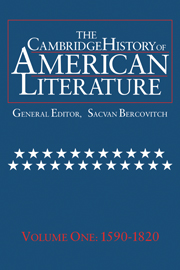Book contents
- Frontmatter
- Introduction
- THE LITERATURE OF COLONIZATION
- 1 The Papers of Empire
- 2 The Natural Inhabitants
- 3 Three Writers of Early America
- 4 Settlements
- 5 The Dispute of the New World
- 6 Traveling in America
- 7 The Final Voyage
- NEW ENGLAND PURITAN LITERATURE
- BRITISH-AMERICAN BELLES LETTRES
- THE AMERICAN ENLIGHTENMENT, 1750–1820
- THE LITERATURE OF THE REVOLUTIONARY AND EARLY NATIONAL PERIODS
- Chronology
- Bibliography
- Index
2 - The Natural Inhabitants
from THE LITERATURE OF COLONIZATION
Published online by Cambridge University Press: 28 March 2008
- Frontmatter
- Introduction
- THE LITERATURE OF COLONIZATION
- 1 The Papers of Empire
- 2 The Natural Inhabitants
- 3 Three Writers of Early America
- 4 Settlements
- 5 The Dispute of the New World
- 6 Traveling in America
- 7 The Final Voyage
- NEW ENGLAND PURITAN LITERATURE
- BRITISH-AMERICAN BELLES LETTRES
- THE AMERICAN ENLIGHTENMENT, 1750–1820
- THE LITERATURE OF THE REVOLUTIONARY AND EARLY NATIONAL PERIODS
- Chronology
- Bibliography
- Index
Summary
The people who already inhabited the North American continent had an old and richly developed oral literature; they did not write. To the diligent writers who proposed to colonize the New World the fact that its inhabitants had no system for writing was a definitive sign of their inferiority. In the eyes of the Europeans, the absence of indigenous writing among the Indians went far to vitiate their claim to the continent.
The first Native-American publication in North America, and until the nineteenth century almost the only one, was a sermon written and preached by Samson Occom (1723?–92) at the execution of a fellow Mohegan convicted of murder. Occom was a minister and worked with the educational mission of Eleazar Wheelock. The preface to the published Sermon Preached at the Execution of Moses Paul, an Indian (1772), begins: ‘The world is already full of books.’ Why, Occom asks, add another, “since the most excellent writings of worthy and learned men are disregarded”? But he then reflects that these writings are “in a very high and refined language” beyond the comprehension of the common people. His “plain, everyday talk” is accessible to everyone; “little children may understand it; and poor Negroes may plainly and fully understand my meaning.” One last group will benefit from a simpler text: “my poor kindred the Indians.” There is a final reason for Occom to publish his “broken hints” and this has to do not with the sermon's readers but with its writer: “as it comes from an uncommon quarter, it may induce people to read it because it is from an Indian.”
- Type
- Chapter
- Information
- The Cambridge History of American Literature , pp. 37 - 58Publisher: Cambridge University PressPrint publication year: 1994

